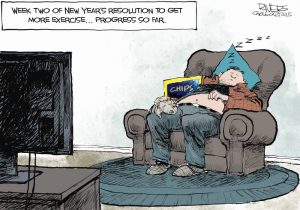
 Recent research continues to suggest that people typically “give up” pursuing their New Year’s resolutions within the first month, with fully two-thirds of people abandoning these pursuits before the end of January.
Recent research continues to suggest that people typically “give up” pursuing their New Year’s resolutions within the first month, with fully two-thirds of people abandoning these pursuits before the end of January.
Statistics like this are reported year in and year out, which can be confounding given the untold millions of people who are emphatic, and genuinely well-intended, with the promises they’ve made to themselves to kick start a fresh trip around the sun.
Other reports indicate that four in ten American adults (about 41.9 percent) are currently obese, and with nearly 20 percent more states today suffering obesity rates above 35 percent versus the year prior, there are compounding concerns as the condition escalates nationwide. Not the least of which is untold millions of Americans needlessly putting themselves at higher risk of—or exacerbating—serious medical conditions like Type 2 diabetes, coronary heart disease, stroke, sleep apnea and more per CDC warnings. Other consequences with mass-scale economic implications include increased workplace absenteeism and higher insurance premiums. In fact, the extreme economic burden of U.S. medical costs associated with treating preventable obesity-related diseases are estimated to increase by $48 to 66 billion per year by 2030. A Harvard School of Public Health report underscores an ominous trajectory if obesity is not aptly addressed by the end of this decade, revealing that, “if U.S. trends continue unabated, by 2030, estimates predict that roughly half of all men and women will be obese.” Other dire study-driven forecasts through 2030 estimate a staggering “Thirty-three percent increase in obesity prevalence and a 130 percent increase in severe obesity prevalence over the next two decades,” also noting that this reality would further hinder healthcare containment cost efforts.
Understanding the need for serious health-focused intervention to get America’s collective weight-driven wellness trending in the right direction, category pioneer HealthyWage continues to tackle the U.S. obesity epidemic head on by using the psychological benefits of game mechanics to motivate weight loss. This as the company is helping more people than ever lose weight and get healthy through its gamification platform founded on study-driven behavioral science and economics principles validated by throngs of esteemed medical research institutions.
Diet Gamification Goes Gangbusters
Founded in 2009, HealthyWage was the very first in the United States to offer cash-based diet incentives directly to consumers. Today, this weight-loss wagering company offers a range of individual and team diet challenges with some paying out as much as $10,000 that are all founded on substantive research and “double-incentivization” methodology proving that competition and rewards — especially the cash variety —can as much as triple the effectiveness of weight-loss programs. Since its inception, HealthyWage has paid nearly a half a million women and men more than $52 million in cash rewards collectively for a combined 10 million pounds lost —and with over 523 participants having lost 100 pounds or more with the program. Also driving gamification in the enterprise and corporate wellness space, the company has formally created competitive, cash-fueled diet gamification programs for more than 90 Fortune 500 and other companies, hospitals, health systems, insurers, school systems, municipal governments and other organizations throughout the U.S. In addition, their program has been more informally run at more than 3,000 companies and organizations.
The proof is in the performance in the form of quantifiable and undeniable metrics that behavioral economics-based gamification works to promote healthful weight loss. Exemplifying the power and efficacy of HealthyWage’s approach are throngs of success stories (both female and male), including Sarah J. who won $3,226 for losing 79 pounds and Preston P. who won $3,007 for losing 160 pounds. As well, Miranda B. lost a staggering 81 pounds and won $2,973 for her efforts, while Brian Y. lost 93 pounds and won $1,792 for his own slimdown success. And these only scratch the surface for the lives transformed by HealthyWage’s money motivation paradigm. So effective is the company’s diet gamification method, famous personalities have joined HealthyWage in the fight to get America fit. For one, the company partners with global health and fitness expert Jillian Michaels to provide free six month access to The Fitness App by Jillian Michaels for participants taking a HealthyWager challenge. Beyond the cash prize potential, this partnership additionally provides participants with custom workouts and meal plans — everything they need to succeed — along with other wellness resources like recipes and that related to meditation, mindfulness and sleep. “Studies continue to show that monetary incentives serve to enhance the effectiveness of, and duly complement, weight-loss programs of any and all sorts, especially when paid out quickly like our various programs,” said HealthyWage co-founder David Roddenberry. “Loss aversion is a powerful dynamic and the reality of having ‘skin in the game’ can propel the results of a gamified weight loss initiative. Indeed, a key element for the success of a gamification program is giving participants something to lose if they fail to meet their goal — whether tangible or intangible.” Whether one is dieting in a personal or professional environment, an array of studies reiterate the importance of the “stick” in the design of a wellness incentive program.
“There are actually throngs of studies demonstrated that the threat of losing something of value is much more effective than the opportunity to win something of equal value,” Roddenberry continued. “That’s precisely why we advocate that program participants ‘pay to play’ and make an investment out of their own pocket in order to win rewards — in our case large cash prizes — for losing weight and getting more active in the program. The average HealthyWager participant more than doubles their investment if they are successful at achieving their goal. The financial upside potential is impressive.” Experts Weigh In Given the multitude of studies and reports upholding the efficacy of gamified health and wellness for both prevention and intervention, credentialed field authorities advocate the benefits of this approach — both related to general healthcare and to diet and fitness in particular. According to Board Certified Sports Dietitian Tara Collingwood, “Losing weight and keeping it off is one of the most difficult behaviors to change. Making a game of increasing exercise and making healthier nutrition choices can be a powerful way to provide additional motivation. People with a competitive streak in them love to have a way to play a game, but also get health benefits at the same time. Having a financial investment or incentive adds another layer of motivation. No one likes to lose money or waste money with no return, either financially or with health rewards.”
Kimberly Gomer, MS, RD, LD/N sees the many opportunities gamification presents in the nutrition and weight-loss space. “So many people rely on their smart phones and apps to provide them with information around how to get healthier and lose weight,” she says. “Any app that offers both support and accountability is a huge asset to a program for those who enjoy that type of connection… Apps that offer fitness support and accountability are extremely helpful for those that want to include fitness in their lifestyle.”
She also believes it is critical not to rely on an app, alone, when it comes to nutrition and diet. “Each person has their own individual challenges around health and creating the pathway to reach their health and weight-loss goals,” Gomer continues. “But, any support system strengthens the resolve and may make the experience more beneficial and more fun.”
Source link
